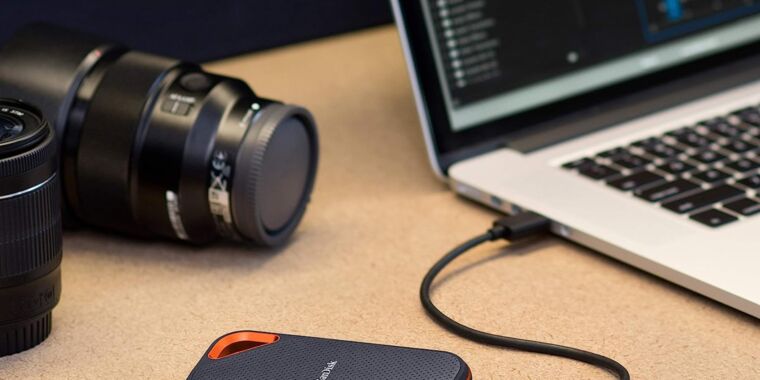- cross-posted to:
- [email protected]
- [email protected]
- [email protected]
- cross-posted to:
- [email protected]
- [email protected]
- [email protected]
cross-posted from: https://yiffit.net/post/1251788
Archived version: https://archive.ph/KYO3X
On Thursday, two more lawsuits were filed against Western Digital over its SanDisk Extreme series and My Passport portable SSDs. That brings the number of class-action complaints filed against Western Digital to three in two days.
In May, Ars Technica reported about customer complaints that claimed SanDisk Extreme SSDs were abruptly wiping data and becoming unmountable. Ars senior editor Lee Hutchinson also experienced this problem with two Extreme SSDs. Western Digital, which owns SanDisk, released a firmware update in late May, saying that currently shipping products weren’t impacted. But the company didn’t mention customer complaints of lost data, only that drives could “unexpectedly disconnect from a computer.”
Further, last week The Verge claimed a replacement drive it received after the firmware update still wiped its data and became unreadable, and there are some complaints on Reddit pointing to recent problems with Extreme drives.
All three cases (one, two, and three) filed against Western Digital this week seek class-action certification (Ars was told it can take years for a judge to officially state certification and that cases may proceed with class-wide resolutions possibly occurring before official certification). Ian Sloss, one of the lawyers representing Matthew Perrin and Brian Bayerl in a complaint filed yesterday, told Ars he doesn’t believe class-action certification will be a major barrier in a case “where there is a common defect in the firmware that is consistent in all devices.” He added that defect cases are “ripe for class treatment.”
Familiar stories
Both complaints filed yesterday reference Lee’s ordeal and Ars’ reporting on the matter, and they share new accounts that sound similar to complaints we’ve seen reported online.
Perrin and Bayerl’s complaint says Perrin bought “at least” eight SanDisk Extreme SSDs off Amazon, including 2TB and 4TB Extreme and 4TB Extreme Pro models, and that Perrin “lost all data stored on several SanDisk SSDs.”
Similarly, Bayerl reportedly bought “at least two” Extreme SSDs, including a 4TB Extreme, off Amazon. The complaint claims the drives still had busted firmware:
Plaintiff Bayerl has experienced the failure of two drives within minutes of each other and is now reluctant to use SanDisk Extreme products. Due to the nature of his work and the data on the devices, Plaintiff Bayerl spent nearly $8,000 on only partially successful efforts to retrieve the data from the failed drives through various data recovery third parties. These efforts also determined that the issue was caused by faulty internal firmware on the drives.
Perrin and Bayerl’s complaint mentions the 2TB Extreme, which Western Digital hasn’t officially confirmed as an affected device. A separate complaint filed on Wednesday mentions the 500GB and 1TB Extreme-series and My Passport models, which Western Digital hasn’t said are affected.
Here are the drives Western Digital has said are affected:
- SanDisk Extreme Portable 4TB (SDSSDE61-4T00)
- SanDisk Extreme Pro Portable 4TB (SDSSDE81-4T00)
- SanDisk Extreme Pro Portable 2TB (SDSSDE81-2T00)
- SanDisk Extreme Pro Portable 1TB (SDSSDE81-1T00)
- Western Digital My Passport 4TB (WDBAGF0040BGY).
Perrin and Bayerl’s complaint says that “the now-known issues with the defective SanDisk SSDs and significant risk of permanent data loss, has rendered the SanDisk SSDs worthless to individuals seeking reliable data storage.”
“Worthless” is also used in the complaint filed Wednesday by Nathan Krum. The complaint filed Thursday on behalf of Saif Jafri also dubbed drives Western Digital named in its firmware update page, as well as the SanDisk Pro-G40 (PetaPixel recently claimed this drive broke after less than a month, but Ars has been unable to determine if the drive has a widespread problem), as “worthless.”
Jafri’s complaint says he bought an Extreme Pro (capacity not specified) because he was on an extended van trip and needed storage for drone footage, photos, and travel mementos. The drive reportedly “failed only a few weeks after” purchase.
“He had written data to the Drive no more than a handful of times, yet he nonetheless lost precious personal data,” the complaint says.
The complaints also note that Western Digital’s 30-day return and five-year warranty policies don’t remedy lost data. The cases seek restitution, including damages, and for Western Digital to stop selling the affected drives until they’re fixed or the problems are fully disclosed on all labels, packaging, and advertising.
Sloss told Ars that challenges of the case might include establishing how frequently drives failed after Western Digital shared its May firmware update.
“We believe the case is strong, that Western Digital’s response to the issue has been delayed, inadequate, and incomplete, and we believe people are continuing to purchase defective SSDs based on misleading information Western Digital has provided,” Sloss said.
Sloss said that firms frequently agree to prosecute similar cases together, with one firm leading. He believes there could be even more law firms investigating claims that may file complaints against Western Digital.
Western Digital told Ars yesterday that it “does not comment on pending litigation.”
🤖 I’m a bot that provides automatic summaries for articles:
Click here to see the summary
In May, Ars Technica reported about customer complaints that claimed SanDisk Extreme SSDs were abruptly wiping data and becoming unmountable.
Western Digital, which owns SanDisk, released a firmware update in late May, saying that currently shipping products weren’t impacted.
Ian Sloss, one of the lawyers representing Matthew Perrin and Brian Bayerl in a complaint filed yesterday, told Ars he doesn’t believe class-action certification will be a major barrier in a case “where there is a common defect in the firmware that is consistent in all devices.”
Jafri’s complaint says he bought an Extreme Pro (capacity not specified) because he was on an extended van trip and needed storage for drone footage, photos, and travel mementos.
The cases seek restitution, including damages, and for Western Digital to stop selling the affected drives until they’re fixed or the problems are fully disclosed on all labels, packaging, and advertising.
Sloss told Ars that challenges of the case might include establishing how frequently drives failed after Western Digital shared its May firmware update.
Saved 78% of original text.
Oh man, I have a SanDisk Extreme Portable 2TB (SDSSDE60-2T00), it got wiped a couple of times and I always assumed it was my fault and tried again. Crazy to read this now.
First one in a while I actually want to jump through the hoops for. I thought it was potentially abuse because it was on a keychain, but it died fast as hell.
SanDisk sells very pretty expensive plastic bricks that excel at disappointment and confusion (like when a USB flash drive decides to become permanently read-only).
I do agree with the plastic brick part - but there is actually reasoning behind that second part - the read-only mode. That happens when the flash is down to a very low amount of life left (usually predetermined by the manufacturer). It is by design because the flash will degrade further if you continue to write to it, so by forcing it to read-only mode, users can still recover their data in a failing/aging SSD. Not to say it isn’t a huge pain in the ass when that happens though, lol
I don’t expect that from a month-old USB drive however. A month old USB drive that write-locks itself is a lemon.
Ahh, yeah. Neither would I. I would expect my USB sticks to last longer than that, lol.
That aside - here’s a fun fact. We sell the NAND from scrapped SSDs that we no longer need for development to a third-party vendor that actually desolders it and uses it for flash drives. So… you never really know what kinda flash storage you get on your flash drives! (Or… we did do this, until the program recently got shuttered because NAND is so damn cheap now)
Is there a date range on the bad ones? I own 3 different 2TB extreme portables (around 4-5 years old) and have had zero issues with them. They are not the model specified tho (i.e, they are not SDSSDE81-2T00).




